- Home
- Paulo Coelho
By The River Piedra I Sat Down & Wept Page 7
By The River Piedra I Sat Down & Wept Read online
Page 7
"From that day on, I couldn't forget that house. Every time I went to the chapel to pray, I realized that my renunciation had not been total. I imagined myself there with you, looking out at the snow on the mountaintops, a fire blazing in the hearth. I pictured our children running around the house and playing in the fields around Saint-Savin."
Although I had never been near the house, I knew exactly what it looked like. And I hoped he'd say nothing else so that I could fantasize.
But he went on.
"For the past two weeks, I haven't been able to stand the sadness in my soul. I went to my superior and told him what was happening to me. I told him about my love for you and what had begun when we were taking the inventory."
A light rain began to fall. I bowed my head and gathered the front of my coat. I suddenly didn't want to hear the rest of the story.
"So my superior said, 'There are many ways to serve our Lord. If you feel that's your destiny, go in search of it. Only a man who is happy can create happiness in others.'
" 'I don't know if that's my destiny,' I told my superior. 'Peace came into my heart when I entered this seminary.'
" 'Well, then, go there and resolve any doubts you may have,' he said. 'Remain out there in the world, or come back to the seminary. But you have to be committed to the place you choose. A divided kingdom cannot defend itself from its adversaries. A divided person cannot face life in a dignified way.'"
He pulled something from his pocket and handed it to me. It was a key.
"The superior loaned me the key to the house. He said that he would hold off for a while on selling the possessions. I know that he wants me to return to the seminary. But he was the one who arranged the presentation in Madrid—so that we could meet."
I looked at the key in my hand and smiled. In my heart, bells were ringing, and the heavens had opened to me. He could serve God in a different way—by my side. Because I was going to fight for that to happen.
I put the key in my bag.
The basilica loomed in front of us. Before I could say anything, someone spotted him and came toward us. The light rain continued, and I had no idea how long we would be there; I couldn't forget that I had only one set of clothes, and I didn't want them to get soaked.
I concentrated on that problem. I didn't want to think about the house—that was a matter suspended between heaven and earth, awaiting the hand of destiny.
He introduced me to several people who had gathered around. They asked where we were staying, and when he said Saint-Savin, one of them told us the story of the hermit saint who was buried there. It was Saint Savin who had discovered the well in the middle of the plaza—and the original mission of the village had been to create a refuge for religious persons who had left the city and come to the mountains in search of God.
"They are still living there," another said.
I didn't know if the story was true, nor did I have any idea who "they" were.
Other people began to arrive, and the group began to move toward the entrance of the grotto. An older man tried to tell me something in French. When he saw that I didn't understand, he switched to an awkward Spanish.
"You are with a very special man," he said. "A man who performs miracles."
I said nothing but remembered that night in Bilbao when a desperate man had come looking for him. He had told me nothing about where he had gone, and I hadn't asked. Right now, I preferred to think about the house, which I could picture perfectly—its books, its records, its view, its furniture.
Somewhere in the world, a home awaited us. A place where we could care for daughters or sons who would come home from school, fill the house with joy, and never pick up after themselves.
We walked in silence through the rain until finally we reached the place where the visions of Mary had occurred. It was exactly as I had imagined: the grotto, the statue of Our Lady, and the fountain—protected by glass—where the miracle of the water had taken place. Some pilgrims were praying; others were seated silently inside the grotto, their eyes closed. A river ran past the entrance, and the sound of the water made me feel at peace. As soon as I saw the image, I said a quick prayer, asking the Virgin to help me—my heart needed no more suffering.
If pain must come, may it come quickly. Because I have a life to live, and I need to live it in the best way possible. If he has to make a choice, may he make it now. Then I will either wait for him or forget him.
Waiting is painful. Forgetting is painful. But not knowing which to do is the worst kind of suffering.
In some corner of my heart, I felt that she had heard my plea.
Wednesday, December 8, 1993
By the time the cathedral's clock struck midnight, the group around us had grown considerably. We were almost a hundred people—some of them priests and nuns—standing in the rain, gazing at the statue.
"Hail, Our Lady of the Immaculate Conception," someone close to me said, as soon as the tolling of the bells ceased.
"Hail," everyone answered, with some applause.
A guard immediately came forward and asked that we be quiet. We were bothering the other pilgrims.
"But we've come a long way," said one of the men in our group.
"So have they," answered the guard, pointing to the others who were praying in the rain. "And they are praying silently."
I wanted to be alone with him, far from this place, holding his hand and telling him how I felt. We needed to talk more about the house, about our plans, about love. I wanted to reassure him, to make clear how strong my feelings were, and to let him know that his dream could come true—because I would be at his side, helping him.
The guard retreated, and one of the priests began to recite the rosary in a low voice. When we reached the creed that closes the series of prayers, everyone remained silent, their eyes closed.
"Who are these people?" I asked.
"Charismatics," he answered.
I had heard of them before but didn't know exactly what their name meant. He could see that I didn't understand.
"These are people who accept the fire of the Holy Spirit," he said, "the fire that Jesus left but that is used by so few people to light their candles. These people are very close to the original truth of Christianity, when everyone was capable of performing miracles.
"They are guided by the Woman Dressed by the Sun," he said, pointing with his eyes to the Virgin.
The group began to chant quietly, as if in response to an invisible command.
"You're shivering from the cold. You don't have to take part in this," he said.
"Are you going to stay?"
"Yes. This is my life."
"Then I'm going to participate," I answered, even though I would have preferred to be far from there. "If this is your world, I want to learn to be a part of it."
The group continued to sing. I closed my eyes and tried to follow the words, even though I couldn't speak French. I repeated the words without understanding them. But their sound helped the time to pass more quickly.
It would end soon. And we could return to Saint-Savin, just the two of us.
I went on singing mechanically—but little by little, I began to feel the music taking hold of me, as if it had a life of its own. It was hypnotizing. The cold seemed less bitter, and the rain no longer bothered me. The music made me feel better. It transported me back to a time when God had felt closer to me and had helped me.
Just as I was about to surrender completely to the music, it stopped.
I opened my eyes. This time, instead of a guard, there was a priest. He approached one of the other priests in our group. They whispered to one another for a few moments, and the padre left.
Our priest turned to us. "We have to say our prayers on the other side of the river," he said.
Silently we walked across the bridge directly in front of the grotto and moved to the other bank. It was a prettier place, on the bank of the river, surrounded by trees and an open field. The river now separated us from th
e grotto. From there, we could clearly see the illuminated image, and we could sing loudly without disturbing others' prayers.
The people around me began to sing louder, raising their faces to the sky and smiling as the raindrops coursed down their cheeks. Some raised their arms, and soon everyone joined in, waving their arms from side to side in rhythm to the music.
I wanted to give in to the moment, but at the same time I wanted to pay close attention to what they were doing. One priest near me was singing in Spanish, and I tried to repeat the words. They were invocations to the Holy Spirit and the Virgin, requesting their presence and asking that they rain down their blessings and their powers on each of us.
"May the gift of tongues befall us," said another priest, repeating the phrase in Spanish, Italian, and French.
What happened next was incomprehensible. Each of the many people present began to speak a language that was different from any I had ever heard. It was more sound than speech, with words that seemed to come straight from the soul, making no sense at all. I recalled our conversation in the church, when he had spoken about revelations, saying that all wisdom was the result of listening to one's own soul. Perhaps this is the language of the angels, I thought, trying to mimic what they were doing—and feeling ridiculous.
Everyone was looking at the statue of the Virgin on the other side of the river; they all seemed to be in a trance. I looked around for him and found him standing at some distance from me. His hands were raised to the heavens and he was speaking rapidly, as if in conversation with Her. He was smiling and nodding his head as if in agreement; occasionally he looked surprised.
This is his world, I thought.
The whole scene began to scare me. The man I wanted at my side was telling me that God is also female, he was speaking an incomprehensible language, he was in a trance, and he seemed closer to the angels than to me. The house in the mountains began to seem less real, as if it were part of a world that he had already left behind.
All of our days together—starting with the conference in Madrid—seemed to be part of a dream, a voyage beyond the space and time of my life. At the same time, though, the dream had the flavor of the world, of romance, and of new adventures. I had tried to resist; now I knew how easily love could set fire to the heart. I had tried to stay unreceptive to all of this in the beginning; now I felt that since I had loved before, I would know how to handle it.
I looked around again, and it dawned on me that this was not the Catholicism I had been taught at school. And this was not the way I had pictured the man in my life.
A man in my life! How strange! I said to myself, surprised at the thought.
There on the bank of the river, looking across at the grotto, I felt both fear and jealousy. Fear because it was all new to me, and what is new has always scared me. Jealousy because, bit by bit, I could see that his love was greater than I'd thought and spread over places where I'd never set foot.
Forgive me, Our Lady. Forgive me if I'm being selfish or small-minded, competing with you for this man's love.
But what if his vocation wasn't to be with me but was to retreat from the world, locking himself in a seminary and conversing with angels? How long would he resist before he fled from our house to return to his true path? Or even if he never went back to the seminary, what price would I have to pay to keep him from returning to that path?
Everyone there, except me, seemed to be concentrating on what they were doing. I was staring at him, and he was speaking the language of the angels.
Suddenly, fear and jealousy were replaced by calm and solitude. The angels had someone to talk with, and I was alone.
I had no idea what pushed me into trying to speak that strange language. Perhaps it was my strong need to connect with him, to tell him what I was feeling. Perhaps I needed to let my soul speak to memy heart had so many doubts and needed so many answers.
I didn't know exactly what to do, and I felt ridiculous. But all around me were men and women of all ages, priests and laypeople, novices and nuns, students and old-timers. They gave me the courage to ask the Holy Spirit for the strength to overcome my fear.
Try, I said to myself. All you have to do is open your mouth and have the courage to say things you don't understand. Try!
I prayed that this night—the night following a day that had been so long that I couldn't even remember how it had begun—would be an epiphany. A new beginning for me.
God must have heard me. The words began to come more easily—and little by little they lost their everyday meanings. My embarrassment diminished, my confidence grew, and the words began to flow freely. Although I understood nothing of what I was saying, it all made sense to my soul.
Simply having the courage to say senseless things made me euphoric. I was free, with no need to seek or to give explanations for what I was doing. This freedom lifted me to the heavens—where a greater love, one that forgives everything and never allows you to feel abandoned, once again enveloped me.
It feels as if my faith is coming back, I thought, surprised at the miracles that love can perform. I sensed that the Virgin was holding me in her lap, covering me and warming me with her mantle. The strange words flew more rapidly from my lips.
Without realizing it, I began to cry. Joy flooded my heart—a joy that overpowered my fears and was stronger than my attempts to control every second of my life.
I realized that my tears were a gift; at school, the sisters had taught me that the saints wept with ecstasy. I opened my eyes, gazed at the darkness of the heavens, and felt my tears blending with the raindrops. The earth was alive and the drops from above brought the miracles of heaven with them. We were all a part of that same miracle.
How wonderful that God may be a woman, I said to myself, as the others continued to chant. If that's true, then it was certainly God's feminine face that taught us how to love.
"Let us pray in tents of eight," said the priest in Spanish, Italian, and French.
Once again, I was confused. What was happening? Someone came over to me and put his arm around my shoulders. Another person did the same on my other side. We formed a circle of eight people, arms around each other's shoulders. Then we leaned forward, our heads touching.
We looked like a human tent. The rain fell harder, but no one cared. The position we had taken concentrated all our energies and heat.
"May the Immaculate Conception help my child find his way," said the man embracing me from the right. "Please, let's say an Ave Maria for my child."
"Amen," everyone said. And we eight prayed an Ave Maria.
"May the Immaculate Conception enlighten me and arouse in me the gift of curing," said a woman from our circle. "Let us say an Ave Maria."
Again, all of us said "Amen" and we prayed. Each person made a petition, and everyone participated in the prayers. I was surprised at myself, because I was praying like a child—and like a child, I believed that our prayers would be answered.
The group fell silent for a fraction of a second. I realized that it was my turn to make a petition. Under any other circumstances, I would have died of embarrassment and been unable to say a word. But I felt a presence, and that presence gave me confidence.
"May the Immaculate Conception teach me to love as she loves," I finally said. "May that love grow in me and in the man to whom it is dedicated. Let us say an Ave Maria."
We prayed together, and again I felt a sense of freedom. For years, I had fought against my heart, because I was afraid of sadness, suffering, and abandonment. But now I knew that true love was above all that and that it would be better to die than to fail to love.
I had thought that only others had the courage to love. But now I discovered that I too was capable of loving. Even if loving meant leaving, or solitude, or sorrow, love was worth every penny of its price.
I have to stop thinking of these things. I have to concentrate on the ritual.
The priest leading the group asked that we disband the tents and pray for the sick
. Everyone continued to pray, sing, and dance in the rain, adoring God and the Virgin Mary. Now and then, people went back to speaking strange languages, waving their arms, and pointing to the sky.
"Someone here… someone who has a sick daughter-in-law… must know that she is being cured," cried one woman.
The prayers resumed, along with chants of joy. From time to time, we would hear the voice of this woman again.
"Someone in this group who lost her mother recently must have faith and know that she is in the glory of heaven."
Later, he would tell me that she had the gift of prophecy, that certain individuals can sense what is happening at some distant place or what will happen in the future.
Secretly, I too believed in the power of that voice that was speaking of miracles. I hoped that voice would speak of the love between two of those present. I hoped to hear that voice proclaim that this love was blessed by all the angels and saints—and by God and by the Goddess.
I'm not sure how long the ritual lasted. People continued to speak in tongues and to chant; they danced with their arms held up to the sky, prayed for the people around them, and petitioned for miracles.
Finally, the priest who was conducting the ceremony said, "Let us chant a prayer for all of those here who are participating for the first time in a Charismatic renewal."
Apparently I was not the only one. That made me feel better.
Everyone chanted a prayer. This time I just listened, asking that favors be granted to me.
I needed many.
"Let us receive the blessing," said the priest.
The crowd turned toward the illuminated grotto across the river. The priest said several prayers and blessed us all. Then everyone kissed, wished each other a "Happy Day of the Immaculate Conception," and went their separate ways.
He came to me. His expression was happier than usual.
"You're soaked," he said.
"So are you!" I laughed.

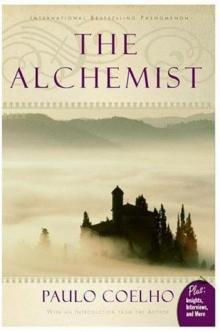 The Alchemist
The Alchemist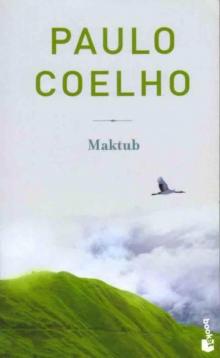 Maktub
Maktub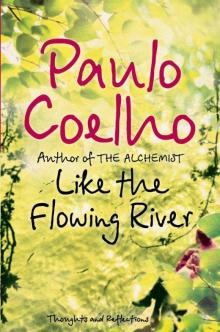 Like the Flowing River
Like the Flowing River The Winner Stands Alone
The Winner Stands Alone The Spy
The Spy By the River Piedra I Sat Down and Wept: A Novel of Forgiveness
By the River Piedra I Sat Down and Wept: A Novel of Forgiveness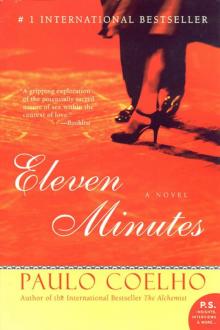 Eleven Minutes
Eleven Minutes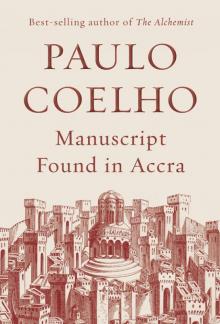 Manuscript Found in Accra
Manuscript Found in Accra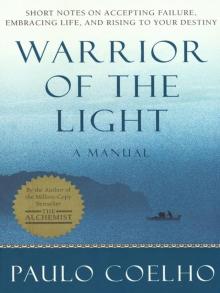 Warrior of the Light
Warrior of the Light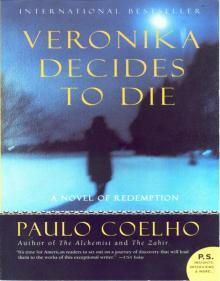 Veronika Decides to Die: A Novel of Redemption
Veronika Decides to Die: A Novel of Redemption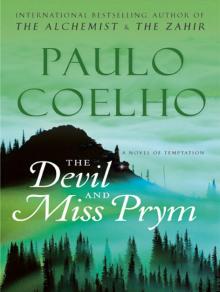 The Devil and Miss Prym: A Novel of Temptation
The Devil and Miss Prym: A Novel of Temptation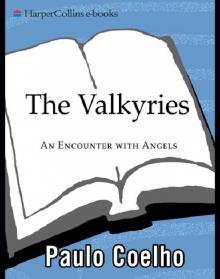 The Valkyries: An Encounter With Angels
The Valkyries: An Encounter With Angels Brida: A Novel
Brida: A Novel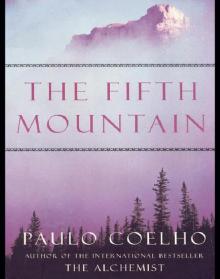 Fifth Mountain: A Novel
Fifth Mountain: A Novel Adultery
Adultery Inspirations
Inspirations The Archer
The Archer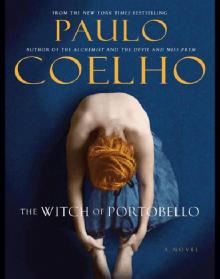 The Witch of Portobello
The Witch of Portobello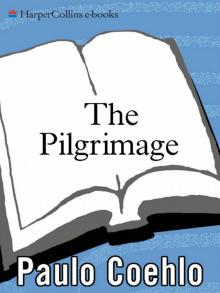 The Pilgrimage
The Pilgrimage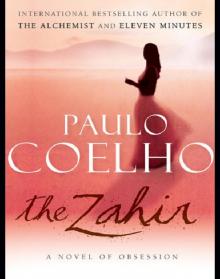 The Zahir
The Zahir Brida
Brida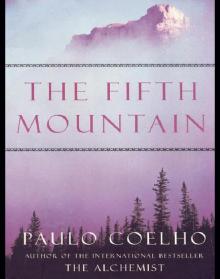 The Fifth Mountain
The Fifth Mountain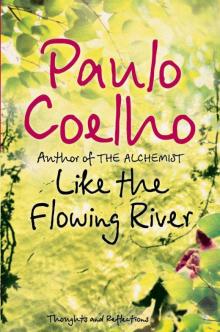 Like the Flowing River: Thoughts and Reflections
Like the Flowing River: Thoughts and Reflections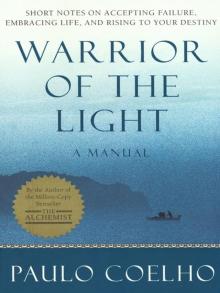 Manual of the Warrior of Light
Manual of the Warrior of Light By The River Piedra I Sat Down & Wept
By The River Piedra I Sat Down & Wept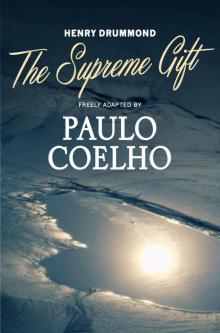 The Supreme Gift
The Supreme Gift Aleph
Aleph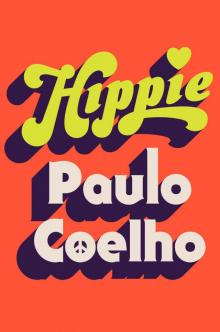 Hippie
Hippie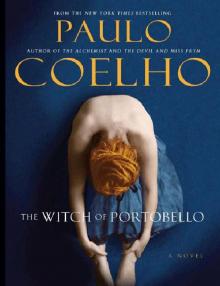 Witch of Portobello
Witch of Portobello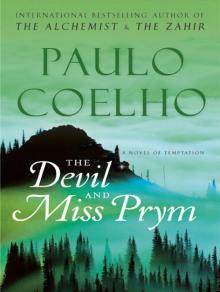 The Devil and Miss Prym
The Devil and Miss Prym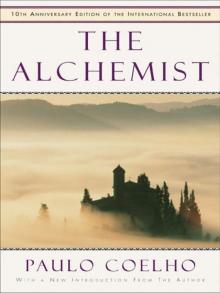 The Alchemist - 10th Anniversary Edition
The Alchemist - 10th Anniversary Edition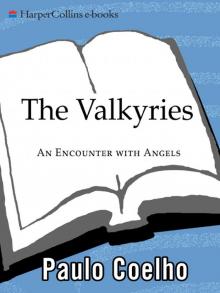 The Valkyries
The Valkyries